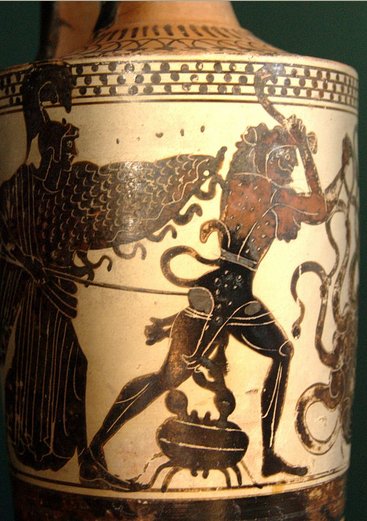Glyph line Ga3 has once again the glyphs 'standing on their feet', after the upside down situation in line Ga2, and the stars in the path of the Sun here belong in Cancer, beginning - according to my current star list - with Heap of Fuel (μ), Tegmine (ζ), and Al Tarf (β):

However, there are also ω and ψ in this region according to the star map above. Fetching data from Wikipedia:
| Pollux |
07h45m19.36s |
07h45.323m |
117.2 |
| ω¹ Cancri |
08h00m55.87s |
08h00.931m |
121.2 |
| ψ² Cancri |
08h10m27.23s |
08h10.454m |
123.6 |
As usual I prefer to ignore less bright stars with the same Greek letters, here ω² and ψ¹ with visual magnitudes 6.32 respectively 6.44.
I then converted the RA time data to my right ascension days according to a formula which counts with the approximate value 1440 minutes per year (60 * 24 * 360 = 1440). For instance:
(8 * 60 + 0.931) / 1440 * 365.25 = 121.99
(7 * 60 + 45.323) / 1440 * 365.25 = 118.03
The differences between the RA day for Pollux and the RA days for the stars in Cancer were then used to calibrate the values to the time horizon in my star list, e.g.:
(121.99 - 118.03) + 117.2 = 121.2
Then I updated my star list (where redmarked stars are new compared to the old list):
|
Pollux |
β Gemini |
1.16 |
28° 09′ N |
07h 42m |
117.2 |
| |
π Gemini |
5.14 |
33° 25′ N |
07h 45m |
117.9 |
|
Azmidiske |
ξ Puppis |
3.34 |
04° 44′ S |
07h 47m |
118.4 |
| |
φ Gemini |
4.97 |
26° 46′ N |
07h 51m |
119.4 |
|
Drus |
χ Carinae |
3.46 |
52° 59′ S |
07h 56m |
120.9 |
| |
ω Cancri |
5.87 |
25° 24′ N |
07h 58m |
121.2 |
| |
χ Gemini |
4.94 |
27° 48′ N |
08h 01m |
122.0 |
|
Naos |
ζ Puppis |
2.21 |
39° 52′ S |
08h 02m |
122.3 |
| |
ρ Puppis |
2.83 |
24° 18′ S |
08h 05m |
123.0 |
|
Heap of Fuel |
μ Cancri |
5.30 |
21° 35′ N |
08h 05m |
123.1 |
| |
ζ Monocerotis |
4.36 |
02° 59′ S |
08h 06m |
123.3 |
| |
ψ Cancri |
5.73 |
25° 30′ N |
08h 07m |
123.6 |
|
Regor |
γ Velorum |
1.75 |
47° 20′ S |
08h 07m |
123.7 |
|
Tegmine |
ζ Cancri |
4.67 |
17° 39′ N |
08h 10m |
124.3 |
|
Al Tarf |
β Cancri |
3.53 |
09° 11′ N |
08h 14m |
125.3 |
|
Bright Fire |
λ Cancri |
5.92 |
24° 01′ N |
08h 18m |
126.4 |
Furthermore
I
inserted
a
button
'new
star
list'
leading
to my
updated
list.
The RA days in my list have to be reduced with 1 day in order to convert them to rongorongo times:
 |
 |
 |
 |
|
Ga2-24 |
Ga2-25 |
Ga2-26 (56) |
Ga2-27 |
|
φ Gemini (118.4) |
Drus
(119.9) |
ω Cancri (120.2) |
8h (121.7) |
|
χ Gemini (121.0),
Naos
(121.3) |
|
July 17
(*118) |
18 |
19 (200) |
July 20 (201) |
|
ºJuly 13 |
14 (195) |
15 (*116) |
ºJuly 16 |
|
'June 20
(171 - 80 + 366 = *457) |
Solstice |
22 (*93) |
'June 23 (*460) |
|
"June 6 (*77) |
7 (*444) |
8 (525) |
"June 9 (*80) |
| ι
Sagittarii (301.2), Terebellum, ξ Aquilae (301.3),
Alshain (301.6), φ Aquilae (301.8) |
ε
Pavonis, θ Sagittarii (302.3), γ Sagittae (302.5), μ Pavonis
(302.7) |
τ
Aquilae (303.8) |
20h (304.4) |
| η Sagittae (304.2), δ Pavonis (304.4) |
|
January 16
(*301) |
17 |
18
(383) |
January 19 (*304) |
|
ºJanuary 12 |
13 (378) |
14 (*299) |
ºJanuary 15 (*300) |
|
'December 20
(354) |
Solstice |
22 |
'December 23 (*277) |
|
"December 6
(*260) |
7 |
8 (342) |
"December 9 |
"It is
the most
inconspicious
figure
in the
zodiac,
and
mythology
apologizes
for its
being
there by
the
story
that
when the
Crab was
crushed
by
Hercules,
for
pinching
his toes
during
his
contest
with the
Hydra in
the
marsh of
Lerna,
Juno
exalted
it to
the sky;
whence
Columella
called
it
Lernaeus.

Yet few
heavenly
signs
have
been
subjects
of more
attention
in early
days,
and few
better
determined;
for,
according
to
Chaldaean
and
Platonist
philosophy,
it was
the
supposed
Gate of
Men
through
which
souls
descended
from
heaven
into
human
bodies."
(Allen)
ω Cancri
is at
the
opposite
side of
the sky
compared
to τ
Aquilae
and the
preceding
star
Drus is
χ
Carinae:

|
Greek omega |
Ω (ω) |
|
Omega
... is the 24th and last letter of
the Greek alphabet. In the Greek numeric
system, it has a value of 800. The word
literally means 'great O' (ō mega, mega
meaning 'great'), as opposed to omicron,
which means 'little O' (o mikron, micron
meaning 'little') ...
The form of the uppercase
letter derives from that of an omicron
(Ο) broken up at the side ... with the
edges subsequently turned outward

The
modern lowercase shape goes back to the
uncial form

a form that developed
during the 3rd century BC in ancient
handwriting on papyrus, from a
flattened-out form of the letter ...
that had its edges curved even further
upward

Possibly, I think, this flattened out
form alluded to the high sky 'carapace' in summer. As to the
'broken up omikron' it could have been turned at is side as an allusion to the orientation of the Gemini pair.
The uncial form could reflect a pair of
twins joined together (at the star
ω Gemini). |


To the 23 Greek lettered stars in
Gemini could be added
the ψ
(whip) currently in Auriga. This border line
case in Gemini can be compared with the border
line case in Cancer, viz. ω, which in G occurred
at day 200 (July 19) = the last day before 8h. A
'crab' has 8 legs plus 2 powerful arms:

|







